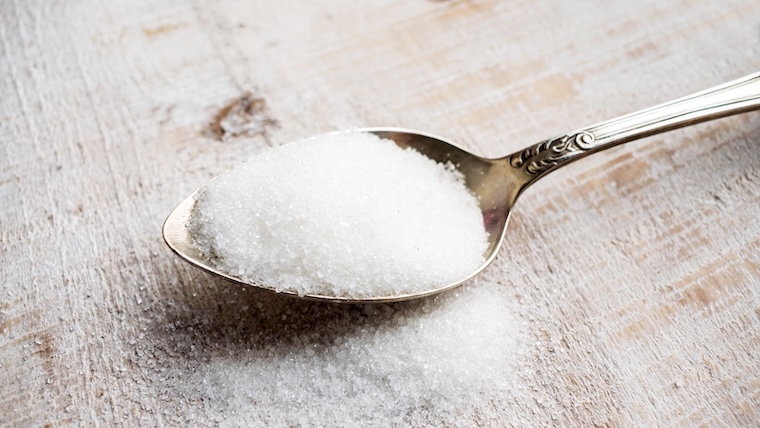Artificial sweeteners are sugar substitutes that add sweetness to foods without the calories of natural sugars. While they offer no nutritional value and are low or calorie-free, they are commonly found in diet drinks, processed foods, pastries, and beverages.
Sucralose, one of the most widely used artificial sweeteners, is about 600 times sweeter than sugar. Although concerns have been raised about its potential effects on gut health, metabolism, and weight loss, sucralose is generally considered safe. (1)
A March 2025 study sparked further debate about sucralose and its role in weight loss. (2)
New Study on the Effects of Sucralose
The study, conducted in March 2025, examined the impact of sucralose on hunger and hypothalamic blood flow across individuals with different body weights. The potential link between artificial sweeteners, including sucralose, and increased hunger has been an ongoing debate, often attributed to various biological mechanisms.
Some theories suggest sucralose may stimulate insulin production, potentially leading to increased feelings of hunger. But “That’s been roughly debunked,” Dr. Layne Nortoin said.
Study Breakdown
The study divided participants into three groups, each consuming sucrose, water, or sucralose dissolved in water. Researchers examined the impact of these substances on hunger, using subjective hunger ratings and measurements of blood flow to the hypothalamus, a brain region critical for regulating hunger and thirst.
The results were consistent across normal-weight and obese individuals: sucralose increased blood flow to the hypothalamus and elevated hunger ratings compared to sucrose. These findings suggest that sucralose may influence hypothalamic activity, potentially intensifying feelings of hunger.
Other Human Randomized Trials
A surface-level analysis might suggest that sucralose stimulates appetite. However, it’s important not to view studies in isolation.
Evidence from other human randomized controlled trials (RCTs) examining sucralose-sweetened beverages and their impact on bodyweight tells a different story. In these trials, sucralose participants showed reduced body weight and decreased overall energy intake. (3)(4)
Furthermore, this new study focuses on short-term, subjective hunger ratings and hypothalamic blood flow, a biochemical mechanism. In contrast, the cited RCTs span a longer duration of 12 weeks and provide concrete, measurable outcomes.

Their findings suggest that sucralose does not increase appetite. On the contrary, it appears to reduce appetite overall.
“How else are these people losing body weight while eating more?” Dr. Norton asked. Hunger levels in the sucralose group remain unchanged compared to those with water. While a mechanism may exist, it never operates in isolation.
There are hundreds of thousands of simultaneously active biochemical mechanisms. Perhaps, this is a mechanism of the hypothalamic blood flow with an adverse effect on hunger.
—Dr. Layne Norton
Takeaway
More randomized controlled trials in humans are necessary to thoroughly examine the impact of sucralose on appetite, energy consumption, and body weight.
I’m not saying no-calorie sweeteners are fat burners. Still, it is evident that substituting these for sugar-sweetened beverages and water, in some cases, has a better effect on satiety.
—Dr. Layne Norton
For those who enjoy drinking water and don’t crave sweets, there’s no need to include non-nutritive sweetened beverages. However, switching to non-nutritive options like diet soda can be effective for individuals who regularly consume sugar-sweetened drinks and aim to lose weight.
Studies show that replacing sugar-sweetened beverages with their non-nutritive counterparts can lead to significant weight loss, with results reaching up to 6.5 kilograms.
More In Research
References
- Schiffman, S. S., & Rother, K. I. (2013). Sucralose, a synthetic organochlorine sweetener: overview of biological issues. Journal of toxicology and environmental health. Part B, Critical reviews, 16(7), 399–451. https://doi.org/10.1080/10937404.2013.842523
- Chakravartti, S. P., Jann, K., Veit, R., Liu, H., Yunker, A. G., Angelo, B., Monterosso, J. R., Xiang, A. H., Kullmann, S., & Page, K. A. (2025). Non-caloric sweetener effects on brain appetite regulation in individuals across varying body weights. Nature metabolism, 7(3), 574–585. https://doi.org/10.1038/s42255-025-01227-8
- Mohan, V., Manasa, V. S., Abirami, K., Unnikrishnan, R., Gayathri, R., Geetha, G., RamyaBai, M., Padmavathi, S., Rajalakshmi, M., Pradeepa, R., Anjana, R. M., Krishnaswamy, K., & Sudha, V. (2024). Effect of Replacing Sucrose in Beverages with Nonnutritive Sweetener Sucralose on Cardiometabolic Risk Factors Among Asian Indian Adults with Type 2 Diabetes: A 12-Week Randomized Controlled Trial. Diabetes therapy : research, treatment and education of diabetes and related disorders, 15(9), 2061–2077. https://doi.org/10.1007/s13300-024-01622-6
- Higgins, K. A., & Mattes, R. D. (2019). A randomized controlled trial contrasting the effects of 4 low-calorie sweeteners and sucrose on body weight in adults with overweight or obesity. The American journal of clinical nutrition, 109(5), 1288–1301. https://doi.org/10.1093/ajcn/nqy381
Featured image via Shutterstock/Iryna Imago